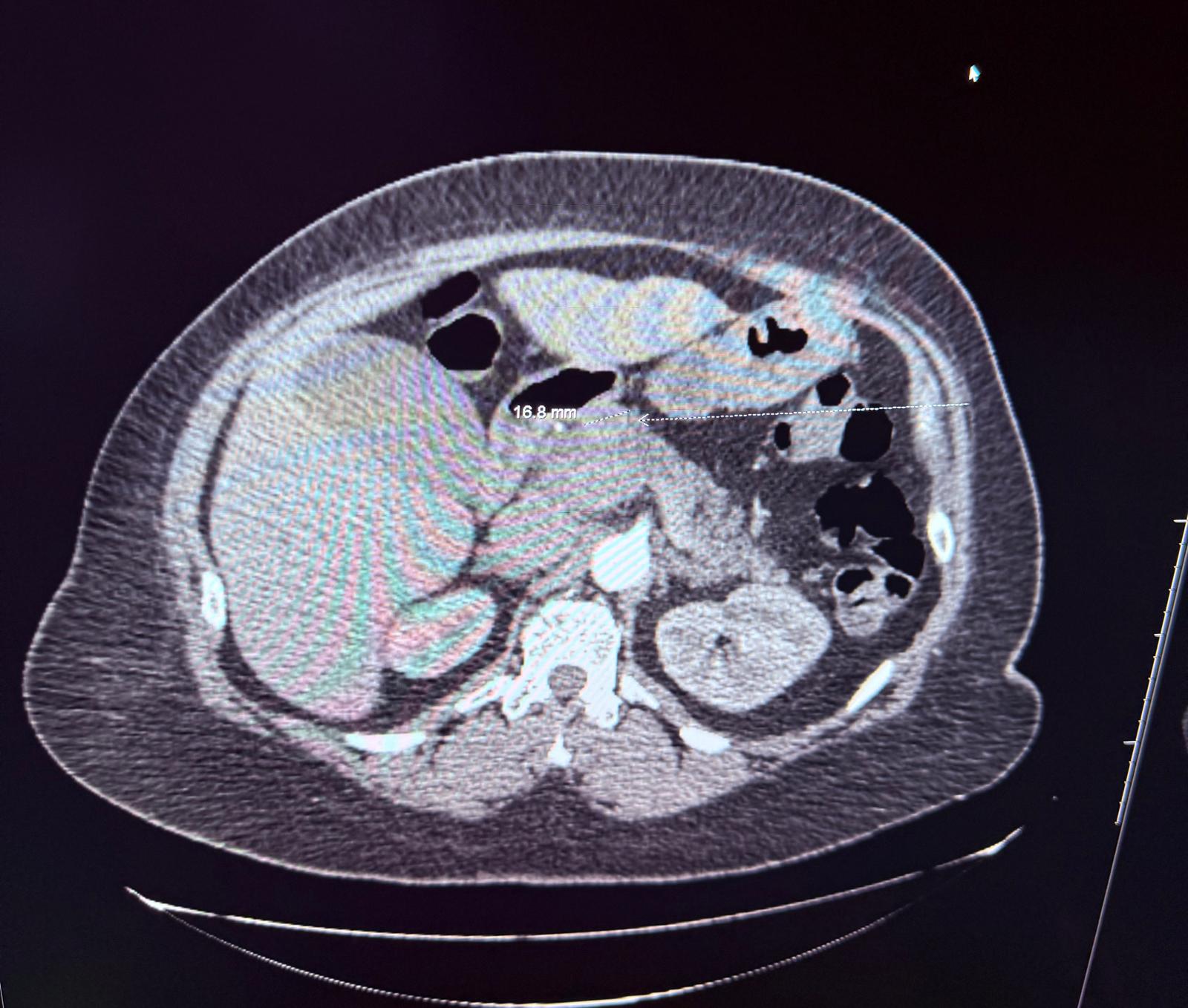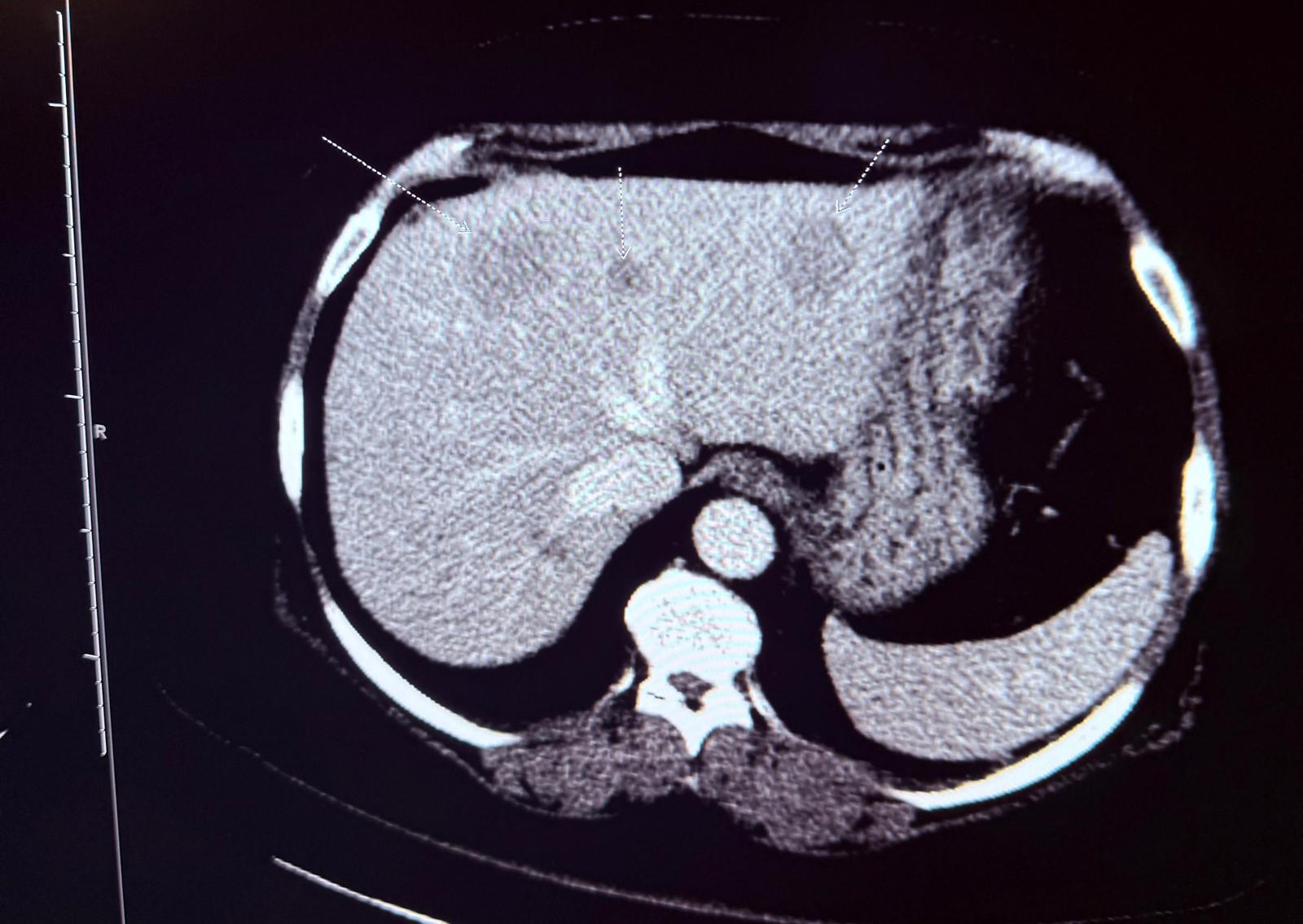Monday Poster Session
Category: Liver
P3832 - Metastatic Pancreatic Neuroendocrine Tumor with Zollinger-Ellison Syndrome: A Rare and Aggressive Clinical Course
Monday, October 27, 2025
10:30 AM - 4:00 PM PDT
Location: Exhibit Hall

Charitha Karanam Ramapathy, MD (she/her/hers)
UAB Montgomery
Montgomery, AL
Presenting Author(s)
Charitha Karanam Ramapathy, MD, Yousif Elmofti, MD, FACG
UAB Montgomery, Montgomery, AL
Introduction: Zollinger-Ellison syndrome (ZES) is an uncommon condition characterized by an overproduction of stomach acid, leading to severe ulcers in the stomach and duodenum. This excess acid is caused by gastrinomas—tumors that secrete the hormone gastrin. Around 25% of these tumors originate in the pancreas and are classified as pancreatic neuroendocrine tumors (PNETs). PNETs are relatively rare tumors arising from the hormone-producing cells of the pancreas. While they are often benign with a favorable outlook, in rare cases they can become metastatic and carry a high risk of mortality. Poor prognosis is associated with higher tumor grade, lymph node and liver metastasis, and larger tumor size. Here we present a case of PNET presenting as ZES and liver metastasis.
Case Description/
Methods: A 42-year-old female presented with a year-long history of nausea, vomiting, abdominal pain, and chronic diarrhea, accompanied by a 40 lb weight loss over six months. Workup for Zollinger-Ellison syndrome revealed elevated gastrin (2034 pg/ml) and chromogranin A (1162 ng/ml). MRI showed a 1.5 cm indeterminate lesion in the left hepatic lobe. EGD revealed gastritis and duodenitis; gastric biopsy was H. pylori-negative, and duodenal biopsy showed metaplasia. She was started on PPIs and H2 blockers. PET-CT revealed pancreatic head and multiple liver lesions, consistent with metastatic pancreatic neuroendocrine tumor (PNET) (Figure 1 & 2). Liver biopsy confirmed a well-differentiated grade 2 NET. Despite chemotherapy, disease progressed. She was referred for Lutathera; however, liver lesions were too small for cytoreduction. She later presented in shock with bowel perforation, underwent emergency surgery for ischemic bowel, but unfortunately died despite aggressive intervention.
Discussion: Functioning pancreatic neuroendocrine tumors (PNETs) include types such as insulinomas, gastrinomas, VIPomas, and glucagonomas, which are characterized by the excessive secretion of specific hormones. Treatment strategies for unresectable tumors are aimed at controlling tumor growth and symptoms may include somatostatin analogs, non-surgical liver-targeted therapies such as hepatic artery embolization, and systemic therapies targeting the tumor. With recent advances in targeted therapies the options are expanding and emphasizes the importance of early detection.

Figure: Figure 1

Figure: Figure 2
Disclosures:
Charitha Karanam Ramapathy indicated no relevant financial relationships.
Yousif Elmofti indicated no relevant financial relationships.
Charitha Karanam Ramapathy, MD, Yousif Elmofti, MD, FACG. P3832 - Metastatic Pancreatic Neuroendocrine Tumor with Zollinger-Ellison Syndrome: A Rare and Aggressive Clinical Course, ACG 2025 Annual Scientific Meeting Abstracts. Phoenix, AZ: American College of Gastroenterology.
UAB Montgomery, Montgomery, AL
Introduction: Zollinger-Ellison syndrome (ZES) is an uncommon condition characterized by an overproduction of stomach acid, leading to severe ulcers in the stomach and duodenum. This excess acid is caused by gastrinomas—tumors that secrete the hormone gastrin. Around 25% of these tumors originate in the pancreas and are classified as pancreatic neuroendocrine tumors (PNETs). PNETs are relatively rare tumors arising from the hormone-producing cells of the pancreas. While they are often benign with a favorable outlook, in rare cases they can become metastatic and carry a high risk of mortality. Poor prognosis is associated with higher tumor grade, lymph node and liver metastasis, and larger tumor size. Here we present a case of PNET presenting as ZES and liver metastasis.
Case Description/
Methods: A 42-year-old female presented with a year-long history of nausea, vomiting, abdominal pain, and chronic diarrhea, accompanied by a 40 lb weight loss over six months. Workup for Zollinger-Ellison syndrome revealed elevated gastrin (2034 pg/ml) and chromogranin A (1162 ng/ml). MRI showed a 1.5 cm indeterminate lesion in the left hepatic lobe. EGD revealed gastritis and duodenitis; gastric biopsy was H. pylori-negative, and duodenal biopsy showed metaplasia. She was started on PPIs and H2 blockers. PET-CT revealed pancreatic head and multiple liver lesions, consistent with metastatic pancreatic neuroendocrine tumor (PNET) (Figure 1 & 2). Liver biopsy confirmed a well-differentiated grade 2 NET. Despite chemotherapy, disease progressed. She was referred for Lutathera; however, liver lesions were too small for cytoreduction. She later presented in shock with bowel perforation, underwent emergency surgery for ischemic bowel, but unfortunately died despite aggressive intervention.
Discussion: Functioning pancreatic neuroendocrine tumors (PNETs) include types such as insulinomas, gastrinomas, VIPomas, and glucagonomas, which are characterized by the excessive secretion of specific hormones. Treatment strategies for unresectable tumors are aimed at controlling tumor growth and symptoms may include somatostatin analogs, non-surgical liver-targeted therapies such as hepatic artery embolization, and systemic therapies targeting the tumor. With recent advances in targeted therapies the options are expanding and emphasizes the importance of early detection.

Figure: Figure 1

Figure: Figure 2
Disclosures:
Charitha Karanam Ramapathy indicated no relevant financial relationships.
Yousif Elmofti indicated no relevant financial relationships.
Charitha Karanam Ramapathy, MD, Yousif Elmofti, MD, FACG. P3832 - Metastatic Pancreatic Neuroendocrine Tumor with Zollinger-Ellison Syndrome: A Rare and Aggressive Clinical Course, ACG 2025 Annual Scientific Meeting Abstracts. Phoenix, AZ: American College of Gastroenterology.
